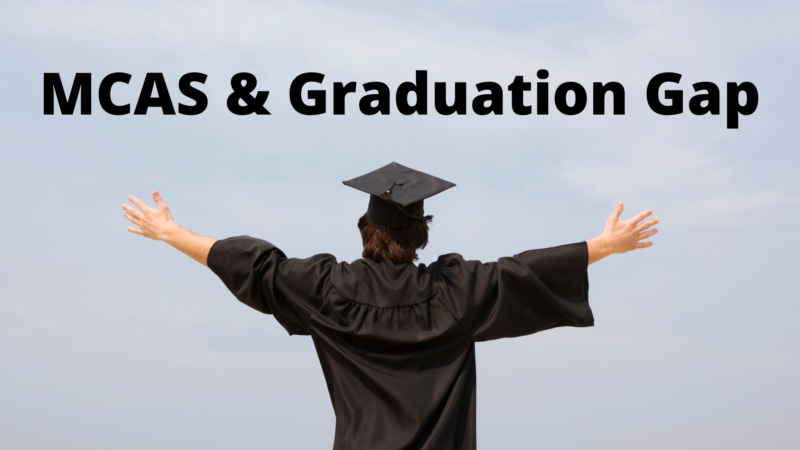Massachusetts’ on-time high school graduation rate has been above the national average for at least three decades, due in part to being among the states with the highest parental education and income levels. However, Massachusetts’ overall graduation rate masks the state’s failure to significantly close the persistent graduation gaps for many historically underserved students. Furthermore, the proposal to raise MCAS graduation requirements may serve to further widen the graduation gaps for two particularly vulnerable overlapping groups, Latinx students and English learners.
In 2018-19, Massachusetts had the 5th largest graduation gap (18 percentage points) in the US between Latinx and White students, and the 6th largest graduation gap (26 points) between English learners (ELs) and non-ELLs. In addition, Massachusetts’ graduation gap between African-American and White students (13 points) was larger than the national average gap (10 points) for these groups. Similarly, Massachusetts’ graduation gap between economically disadvantaged and non-disadvantaged students (10 points) was larger than the national average gap for these students (6 points).
Although graduation rates for these historically underserved groups have risen faster than the rate for all students in Massachusetts, that same trend has been evident in most other states. As a result, Massachusetts has made little progress on its overall graduation rate during almost three decades of education reform when compared to other states.

During the three school years immediately prior to educational reform in Massachusetts (1990-91 to 1992-1993), the state’s average on-time graduation rate for all students* was the 15th highest among the 50 states. In the three most recent years prior to the pandemic (2016-17 to 2018-19), the state’s rank was virtually unchanged at 14th. Furthermore, in 2018-19 Massachusetts was below national averages of on-time graduation for ELs, Latinx and economically disadvantaged students.
Given Massachusetts’ exceptionally high scores on the National Assessment of Educational Progress (NAEP) and abundance of educational resources, it is all the more puzzling why the state has not achieved more success in helping historically underserved students graduate on time.
Although the cause of Massachusetts’ large graduation gaps for underserved students cannot be definitively determined, the MCAS graduation requirement is a possible contributing factor. During the last 25 years, the largest one-year drop in Massachusetts’ graduation rate (1.9%) was from 2001-02 to 2002-03. The latter school year is when the first cohort of seniors had to pass both the English language arts and math MCAS tests to graduate from high school. A coincidence?
No one knows for certain if the proposal to raise the MCAS graduation requirements will or will not impact the graduation rate for historically underserved students. Nonetheless, two groups with notably large graduation gaps, Latinx students and ELs, are at particular risk if the proposal is approved. In the spring of 2019, 10th grade Latinx students were less likely to pass the MCAS tests required for graduation than any other racial/ethnic group, and ELs were less likely to pass these tests than any other high needs group. Moreover, despite ELs high participation in retests, about one-third of ELs never pass all required MCAS and therefore are ineligible for a high school diploma. That dismal result is unlikely to improve if this proposal is approved.
During the MCAS era, Massachusetts has not improved its graduation rates appreciably more than our nation as a whole. In addition, Massachusetts continues to have graduation and NAEP score gaps that are larger than the average gaps in the US. Raising arbitrary passing scores on a set of multiple-choice tests is not the only possible course of action for addressing these problems. There are humane and empirically supported ways to improve the academic success of historically underserved students. The well-being of these students should not be put in jeopardy for the purpose of trying to revive a failed policy.
Louis J. Kruger
Professor Emeritus
Department of Applied Psychology
Bouve’ College of Health Sciences
Northeastern University
*Prior to 2011, states reported on-time graduation data to the federal government by using the averaged freshman graduation rate (AFGR) formula. In 2011, the transition began to the more accurate adjusted cohort graduation rate (ACGR) formula. During several overlapping years, the average difference between the two measures in Massachusetts was less than 1%. In this paper, data cited before 2011 were based upon AFGR.
References
Atwell, M., Balfanz, R., Manspile, E., Byrnes, V., & Bridgeland, J. (2021) Building a Grad Nation: Progress and Challenge in Raising High School Graduation Rates. Retrieved from https://eric.ed.gov/?id=ED617355
Massachusetts Department of Elementary and Secondary Education (2019). Spring 2019 MCAS Tests: Summary of State Results. Retrieved from https://archives.lib.state.ma.us/bitstream/handle/2452/808673/ocn753986717-2019.pdf?sequence=1&isAllowed=y
National Center for Education Statistics. (2022). Public High School Graduation Rates. Condition of Education. U.S. Department of Education, Institute of Education Sciences. Retrieved from https://nces.ed.gov/programs/coe/indicator/coi.
National Center for Education Statistics. (2020). Digest of Education Statistics. Table 219.46. Public high school 4-year adjusted cohort graduation rate (ACGR), by selected student characteristics and state: 2010-11 through 2018-19.
National Center for Education Statistics (2015). Digest of Education Statistics. Table 219.35. Public high school averaged freshman graduation rate (AFGR), by state or jurisdiction: Selected years, 1990-91 through 2012-13. Retrieved from https://nces.ed.gov/programs/digest/d19/tables/dt19_219.35.asp
National Center for Education Statistics (2006). Digest of Education Statistics. Table 101. Averaged freshman graduation rates for public secondary schools, by state: 1990–91 through 2003–04. Retrieved from
National Center for Education Statistics (2019). National Assessment of Educational Progress (NAEP). NAEP test scores retrieved from https://www.nationsreportcard.gov/ndecore/xplore/nde
Papay, J. (April, 2022). Competency Determination and Long-Run Outcomes in Massachusetts. Retrieved from https://www.doe.mass.edu/bese/docs/fy2022/2022-04/item2-powerpoint.pptx

